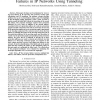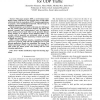TON
2010
13 years 6 months ago
2010
Abstract--A framework for designing feedback-based scheduling algorithms is proposed for elegantly solving the notorious packet missequencing problem of a load-balanced switch. Unl...
TON
2010
13 years 6 months ago
2010
Aggregate traffic loads and topology in multi-hop wireless networks may vary slowly, permitting MAC protocols to `learn' how to spatially coordinate and adapt contention patte...
TON
2010
13 years 6 months ago
2010
Abstract--This paper develops novel mechanisms for recovering from failures in IP networks with proactive backup path calculations and IP tunneling. The primary scheme provides res...
TON
2010
13 years 6 months ago
2010
Abstract--This paper proposes KISS, a novel Internet classification engine. Motivated by the expected raise of UDP traffic, which stems from the momentum of P2P streaming applicati...
TON
2010
13 years 6 months ago
2010
With the fast progress of MIMO technology and its growing applications in networks, it is important to develop techniques to enable more efficient MIMO network communications. Howe...
TON
2010
13 years 6 months ago
2010
Abstract-- Security issues and attack management in transparent WDM (Wavelength Division Multiplexing) optical networks has become of prime importance to network operators due to t...
TON
2010
13 years 6 months ago
2010
In this paper, we develop a distributed rate-control algorithm for networks with multiple unicast sessions when network coding is allowed across different sessions. Building on rec...
TON
2010
13 years 6 months ago
2010
This paper presents Interleaved Stratified Timer Wheels as a novel priority queue data structure for traffic shaping and scheduling in packet-switched networks. The data structure ...
TON
2010
13 years 6 months ago
2010
The Maximum Differential Backlog (MDB) control policy of Tassiulas and Ephremides has been shown to adaptively maximize the stable throughput of multihop wireless networks with ran...
TON
2010
13 years 6 months ago
2010
Distributed opportunistic scheduling (DOS) is studied for wireless ad-hoc networks in which many links contend for the channel using random access before data transmissions. Simpl...


